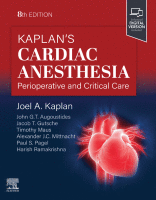Physical Address
304 North Cardinal St.
Dorchester Center, MA 02124

KEY POINTS 1. Isoflurane, desflurane, and sevoflurane decrease myocardial contractility, delay left ventricular (LV) relaxation, and attenuate early LV filling, but do not affect LV compliance. 2. Volatile anesthetics dilate arteriolar resistance and venous capacitance vessels, but do not alter…

Key Points 1. The coronary circulation is composed of several types of blood vessels, each with different structure and function, including the superficial conductive arteries, prearterioles, arterioles (resistance vessels), capillaries, and veins. 2. The major determinants of coronary blood flow…

Key Points 1. The cartilaginous skeleton, myocardial fiber orientation, valves, blood supply, and conduction system of the heart determine its mechanical capabilities and limitations. 2. The cardiac myocyte is engineered for contraction and relaxation, not protein synthesis. 3. Laplace’s law…

Key Points 1. The coronavirus disease 2019 (COVID-19) continues to have a devastating impact on virtually all aspects of human life, from the healthcare system to the economy, social relations, and mental health. 2. Key mechanisms that may have a…

Key Points 1. Transvenous cardiac implantable electronic devices (CIEDs) include pacemakers (PMs), implantable cardioverter defibrillators (ICDs), and cardiac resynchronization therapy pacemakers (CRT-Ps) and defibrillators (CRT-Ds). In addition to delivering antitachycardia therapy, all modern transvenous ICDs and CRT-Ds have antibradycardia pacing…

Key Points 1. The cardiac catheterization laboratory (CCL) has evolved from a purely diagnostic facility to a therapeutic one in which many facets of cardiovascular disease can be effectively modified or treated. Despite improvements in equipment, the quality of the…

Key Points 1. Perioperative cardiac morbidity is multifactorial, and understanding the predictive risk factors helps define the risk for individual patients. 2. Assessment of myocardial injury is based on the integration of information from myocardial imaging, electrocardiography, and serum biomarkers.…